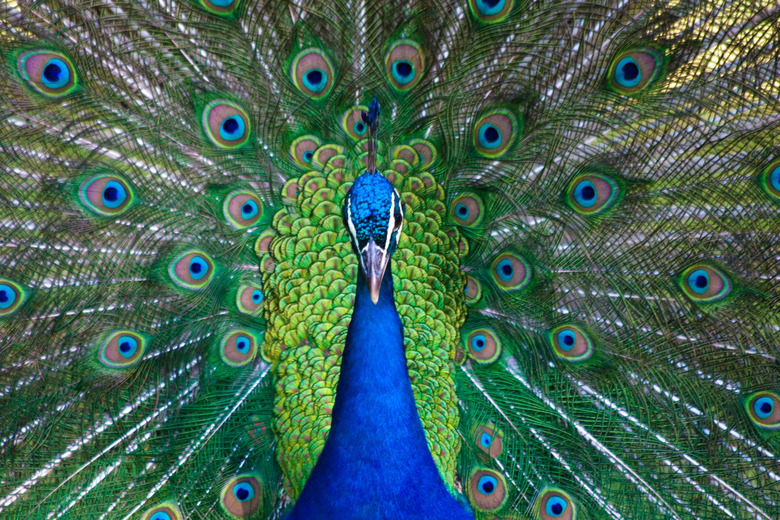Reasons To Fear Peacocks
Though the peacock is well-regarded for its lustrous feathers and its regal appearance – to the point that it was declared the national bird of India – many people are genuinely scared of peafowl. Ornithophobia is the fear of birds in general, but enough people have experienced feelings of terror and panic in the presence of peacocks that the term "pavophobia" has entered the lexicon. And for good reason: Peafowl can be aggressive birds, and peacocks (male peafowl, known for their patterned tail feathers) even more so.
TL;DR (Too Long; Didn't Read)
While the average person has nothing to fear from a peacock, a fear of the bird is sensible: Peacocks can grow to be roughly 4 feet tall, have sharp beaks and talons, and are known to be both aggressive and fiercely territorial, particularly during mating seasons. Their ability to fly and their tendency to take food as they desire it has led to numerous peacock attack reports at zoos and in urban or suburban areas where wild peacocks congregate. There have also been concerns about the free-ranging birds acting as a vector for avian flu to spread – though this has not been confirmed. It should be noted, however, that peacock attacks are uncommon.
Peacock Facts
Peacock Facts
A peacock's physical traits alone can justify a healthy fear of the birds: Though only male peafowl possess the bright trains of tail feathers the species is known for, both peacocks and peahens (female peafowl, with plain white feathers) are large birds – as large as a dog of moderate size, with some birds clocking in at roughly 4 1/2 feet tall, with a wingspan of the same length. Peafowl have sharp beaks and talons on their feet, and emit a piercing shriek that can startle even a practiced avian caretaker. Even worse for those with ornithophobia, the birds are capable of flight.
Peacock Behavior
Peacock Behavior
In addition to their impressive physical traits, peacock behavior is a common cause for fear. Peafowl, and peacocks especially, are known to be aggressive, fiercely territorial birds. Peahens who have laid eggs will attack anyone who gets too close to their nest, and peacocks – who prefer to keep a harem of peahens to themselves when mating – will attack other males when they feel encroached upon. Combined with the peacock's low intelligence, this has caused wild peacocks in urban areas to attack dark-colored luxury cars: the birds see their reflections, interpret it as a second bird and attack. Peacocks have also been seen chasing people to take their food. At the same time, when a peacock is angry they have a tendency to spread themselves out – and seeing a bird your size or larger fan out, with feathers that could be misconstrued as eyes, is more than enough to cause a child to develop a long-standing phobia.
Peacock Attacks
Peacock Attacks
While peacocks do not frequently attack people, it happens enough that the birds have been featured in a number of news stories about zoo trips gone wrong. The birds have pecked and scratched at children, sending them to hospitals for stitches, and in one town plagued by the birds, hundreds of dollars in property damage have been caused by peacocks attacking their own reflections. This – alongside fears that peafowl might act as a vector for avian flu – has led to a number of zoos sending their peafowl populations to bird sanctuaries.
References
- CBS News: Feral Peacocks Are Attacking Luxury Cars After Seeing Their Own Reflections
- Washington Post: Why Zoos Are Purging Themselves of Peacocks
- Express UK: Residents Are in a Flap Over Aggressive Peacock on the Loose in Their Neighbourhood
- Lisa's Writopia: Pavophobia and a Pride of Peacocks
- Beauty of Birds: Peafowl
- Houston Press: Peacock Attacks Actually Do Exist
- Animal Diversity Web: Pavo Cristatus (Indian Peafowl)
Cite This Article
MLA
Flournoy, Blake. "Reasons To Fear Peacocks" sciencing.com, https://www.sciencing.com/reasons-fear-peacocks-8631075/. 22 November 2019.
APA
Flournoy, Blake. (2019, November 22). Reasons To Fear Peacocks. sciencing.com. Retrieved from https://www.sciencing.com/reasons-fear-peacocks-8631075/
Chicago
Flournoy, Blake. Reasons To Fear Peacocks last modified March 24, 2022. https://www.sciencing.com/reasons-fear-peacocks-8631075/
